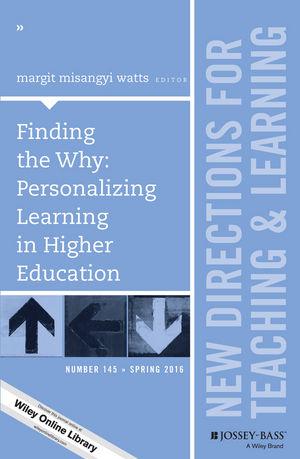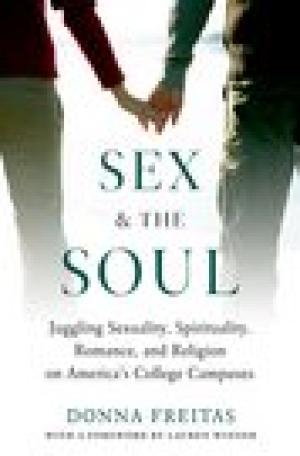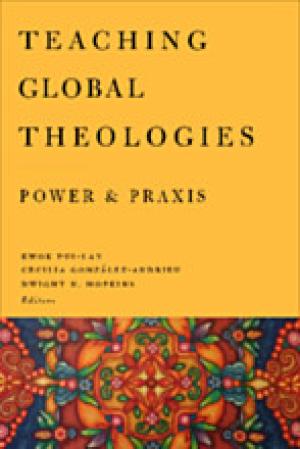Resources

Click Here for Book Review Abstract: This volume addresses how we might help students find the “why” of their educational endeavors. The ideas found in this volume range from: - changing the perceptions and attitudes of whole communities toward education, - retuning the first year experience to give students more opportunities to find meaning in their learning, - suggesting new ways of integrating students’ experiences with their learning in core courses, and - connecting major initiatives already in place to demonstrate how we might restructure undergraduate education through the content of the curriculum, the way we teach, and our curricular learning experiences. This is the 145th volume of this Jossey-Bass higher education series. It offers a comprehensive range of ideas and techniques for improving college teaching based on the experience of seasoned instructors and the latest findings of educational and psychological researchers. (From the Publisher)

Based on dozens of face-to-face interviews, Sex and the Soul explores the sexual and spiritual lives of today's college students. Donna Freitas crisscrossed the country, visiting a range of America's colleges and universities--from public to private, Catholic to evangelical--to find out what students had to say about these highly personal subjects. Their stories will not only engage readers, but, in many cases, move them with the painful struggles these candid young women and men face. Indeed, the book uncovers aspects of college life that may unsettle some readers, especially parents. Many campuses, for instance, are dominated by the pervasiveness of hook-up culture. Moreover, many students see little connection between sex and religion, even as they seek one between sex and spirituality. Indeed, these observations hold true even at Catholic schools. Only at evangelical colleges is religion an important factor when deciding whether or not to engage in sex. But Freitas's research also reveals that, even at secular schools, students are not comfortable with a culture of casual sex, and that they do want spirituality, at least, if not also religion, to speak about what they should do and who they should try to be--not just what they should avoid doing. Sex and the Soul will offer readers the chance to hear college students speaking honestly about extremely sensitive topics, in a book that will be of great interest to students, parents, clergy, teachers, and anyone who wants to know what's happening on today's college campuses. (From the Publisher)

Click Here for Book Review Abstract: Theological education, like theology itself, is becoming a truly a global enterprise. As such, theological education has to form, teach, and train leaders of faith communities prepared to lead in a transnational world. The teaching of theology with a global awareness has to wrestle with the nature and scope of the theological curriculum, teaching methods, and the context of learning. Teaching Global Theologies directly addresses both method and content by identifying local resources, successful pedagogies of inclusion, and best practices for teaching theology in a global context. The contributors to Teaching Global Theologies are Catholic, mainline Protestant, and evangelical scholars from different racial and ethnic backgrounds, each with sustained connections with other parts of the world. Teaching Global Theologies capitalizes on this diversity to uncover neglected sources for a global theology even as it does so in constructive conversation with the long tradition of Christian thought. Bringing missing voices and neglected theological sources into conversation with the historical tradition enriches that tradition even as it uncovers questions of power, race, ethnicity, class, gender, and sexuality. Teachers are offered successful pedagogies for bringing these questions into the classroom and best practices to promote students’ global consciousness, shape them as ecclesial leaders, and form them as global citizens. (From the Publisher)

Racial Battle Fatigue is described as the physical and psychological toll taken due to constant and unceasing discrimination, microagressions, and stereotype threat. The literature notes that individuals who work in environments with chronic exposure to discrimination and microaggressions are more likely to suffer from forms of generalized anxiety manifested by both physical and emotional syptoms. This edited volume looks at RBF from the perspectives of graduate students, middle level academics, and chief diversity officers at major institutions of learning. RBF takes up William A. Smith’s idea and extends it as a means of understanding how the “academy” or higher education operates. Through microagressions, stereotype threat, underfunding and defunding of initiatives/offices, expansive commitments to diversity related strategic plans with restrictive power and action, and departmental climates of exclusivity and inequity; diversity workers (faculty, staff, and administration of color along with white allies in like positions) find themselves in a badlands where identity difference is used to promote institutional values while at the same time creating unimaginable work spaces for these workers. (From the Publisher)
One page Teaching Tactic: a series of student pairings discuss questions about religious identity in a World Religions Course.
Discoveries by both the professor and the students, in a seminar on the anthropology of Christianity at Candler School of Theology.
See the responses by Nancy Fuchs Kreimer, Yael Shy, and Yehuda Sarna directly following in the table of contents linked here. Rabbinical students gain important knowledge and become more reflective teachers by learning about other religions and with people who practice them. They can also learn how to help educate non-Jews about Judaism and serve as representatives of, and advocates for, our community.

Click Here for Book Review Abstract: There is still resistance in Christian institutions to interreligious dialogue. Many feel that such a practice weakens Christian faith, and promotes the idea that Christianity is merely one among many different religious options. When it comes to higher education, there is the fear that both college and seminary students will “lose their faith” if they are invited to study other religious traditions from a positive perspective. Unfortunately, this attitude belies the current culture in which we live, which constantly exposes us to the beliefs and practices of others. Kristin Johnston Largen sees this setting as an opportunity and seeks to provide not only the theological grounding for such a position but also some practical advice on how both to teach and live out this conviction in a way that promotes greater understanding and respect for others and engenders a deeper appreciation of one’s own faith tradition. Largen’s synopsis of interreligious education and suggested action includes contributions by Mary E. Hess and Christy Lohr Sapp. Hess and Sapp provide practical commentary regarding the successful implementation of Largen’s proposed approach. As a group, Largen, Hess, and Sapp create a text that extends pedagogical innovation in inspiring but practical ways. (From the Publisher)

"Graff offers a highly readable and down-to-earth perspective on some of the most ballyhooed issues in higher education today. . . . By encouraging us to argue together, he may yet help us to reason together."—Henry Louis Gates, Jr. Higher education should by a battleground of ideas: the real problem, Gerald Graff says, is that students are not getting more out of the battle. In this lively book, Graff argues that the "culture wars" now being fought over multiculturalism and political correctness are actually a sign of the intellectual vitality of American education—but they need to be used creatively, made part of the educational process itself. (From the Publisher)
One page Teaching Tactic: using, and critiquing, social media to learn about and learn to interpret current events and the role of technology.